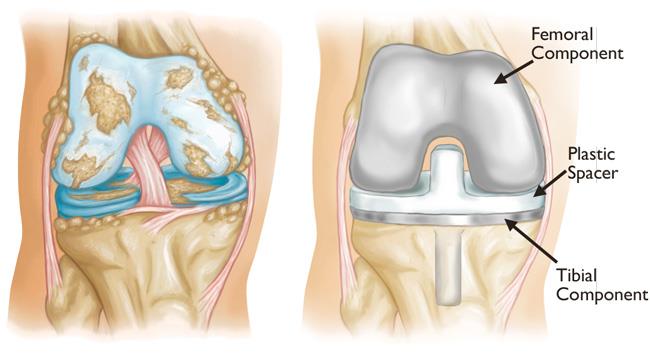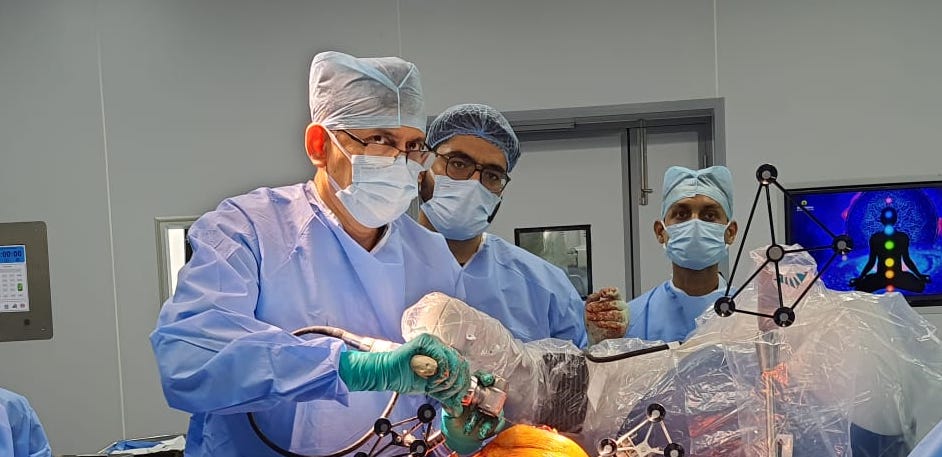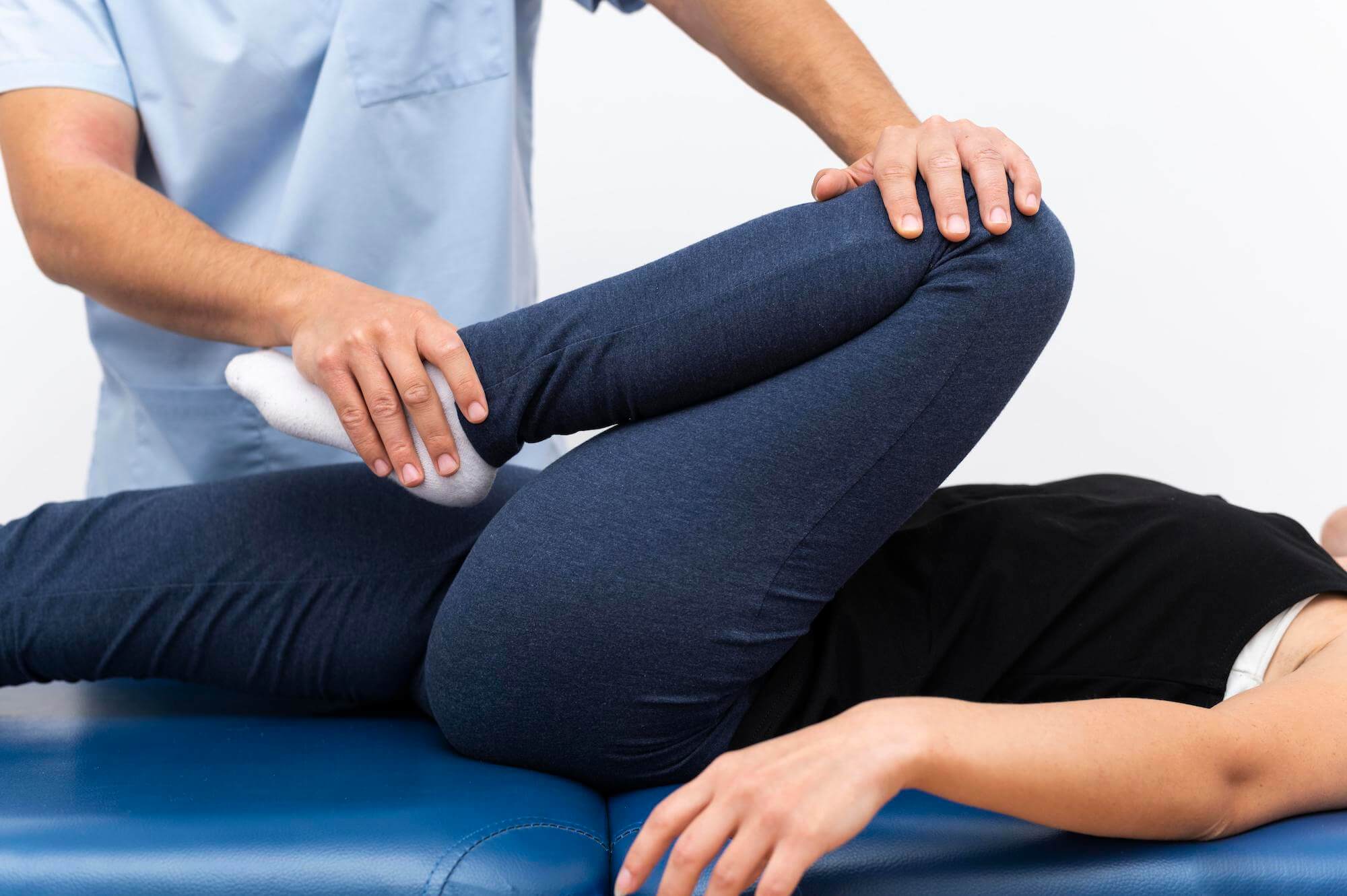
Total Knee Replacement
Unlike what most people believe, a knee replacement does not involve a complete replacement of your knee. It simply involves removing the worn out surface by about 10 millimetre and changing it to a metallic and polyethylene implant
- Robotic Total Knee Replacement for increased accuracy
- Oxinium Impregnated Implants for longevity
- Complex replacements for badly deformed joints
What is a Total Knee Replacement?
Video on patient testimonials
When to undergo a Total Knee Replacement
Total Knee Replacement is recommended mostly for patients who are suffering from Osteoarthritis of the knee. This is when the cartilage lining the bone has worn out significantly. Not all cases of osteoarthritis need a total knee replacement, some can be managed with physiotherapy and appropriate medicines. Patients with severe pain and deformity in grade 3 or 4 of osteoarthritis are usually suggested a total knee replacement to help them return to daily activities.
What to Expect Before Surgery
You will be admitted to the hospital one day before surgery and made comfortable. You will be asked to stop most blood thinners 3-5 days prior to your surgery. A thorough investigation of your health status will be done to minimise the risk of complications before surgery, this would include a blood panel, chest X-rays, advanced cardiac imaging like a 2D Echocardiography and if needed by the physician, additional investigations may be done by the doctor to ensure you are fit to undergo a total knee replacement.
If you are diabetic, your sugar levels should be under control to prevent wound related complications. Physiotherapy for knee strengthening will decrease your post-operative rehabilitation time
If you are diabetic, your sugar levels should be under control to prevent wound related complications. Physiotherapy for knee strengthening will decrease your post-operative rehabilitation time
What to Do Once Admitted to the Hospital
Once you are admitted, you should be rest assured that you are in good hands. A good nights sleep is what you need before your surgery the next day. You will be kept fasting before surgery for upto 6-8 hours to prevent any anaesthesia related complications. We will keep you hydrated with IV fluids during this period.
What Will done once in the Operating Suite
You will be wheeled into the Operating suite and transferred to the Operating Table where you will meet our staff and the anaesthetist who will ask you basic questions about your health. You will be repeatedly asked which side you want operated, do not be alarmed by this, this is just to make sure that there is no miscommunication regarding the site of surgery.
The anaesthetist will then explain to you the procedure and then proceed to give you spinal anaesthesia or general anaesthesia depending on your health and fitness.
Once we have confirmed that you cannot feel anything in your knee area, we will start preparing for the surgery
The anaesthetist will then explain to you the procedure and then proceed to give you spinal anaesthesia or general anaesthesia depending on your health and fitness.
Once we have confirmed that you cannot feel anything in your knee area, we will start preparing for the surgery
What will be done during surgery
We will clean throughly the leg that is to be operated. We follow gold standard aseptic precautions while preparing your knee for surgery.
Once that is done, we will isolate the knee area and keep all instruments ready that will be required during the procedure.
The actual surgery will last only about 45 minutes however, anaesthesia and meticulous wound closure might take time. Most patients are not in the operating suite for more than 2 hours.
Once that is done, we will isolate the knee area and keep all instruments ready that will be required during the procedure.
The actual surgery will last only about 45 minutes however, anaesthesia and meticulous wound closure might take time. Most patients are not in the operating suite for more than 2 hours.
What Will be done after surgery
Your knee will be wrapped in a bandage and may have a plastic tube connected to a container that will drain the excess blood that collects in the knee
This drain is usually removed 1-2 days after the surgery. You will usually be discharged from the hospital after 2 – 3 days, depending on your health and overall fitness.
This drain is usually removed 1-2 days after the surgery. You will usually be discharged from the hospital after 2 – 3 days, depending on your health and overall fitness.
When Will I walk after surgery
Most patients are encouraged to walk the same or next day after surgery. Initially for 3-6 weeks, you will need some support while walking, usually with the help of a walker, however, you will be sitting on the chair and commode and will be allowed full knee movement from the same or next day of surgery.
Will it be Painful
Pain prevention is as important to us as it is to the you. We therefore follow the WHO Analgesic Ladder guidelines and provide patients with painkillers to make sure that they are relatively pain free after surgery. We also inject local anaesthetics into the joint during surgery which last for 18-24 hours and help prevent pain in the post-op period.
10 Tips For Keeping Your Knee Healthy
What You Need to Know Before Your Appointment
It’s best to be prepared when coming in for your appointment and therefore we recommend bringing the following when you visit us
All Previous Investigations
This includes any X-rays, MRI, CT Scans and their reports, new as well as old
List of Your Medications
A well formed list of medications will help us decide which medications will not react with others you might be taking
Previous Surgery Documents
If you have undergone a surgery before, any documents pertaining to that time will be helpful in understand what was done at that time

“Thanks to Dr. Vinod I was able to resume my Bharatnatyam after undergoing a Total Knee Replacement. I was suffering from Pain for a long time and it was affecting my art. My students and I wholeheartedly thank Dr. Vinod”
Mrs. Anjana
Bharatnatyam Teacher
Above image is of her after undergoing a total knee replacement.
Above image is of her after undergoing a total knee replacement.
Better Health Care is Our Mission
24/7 service.Next Day Appointments are Often Available.
+91-9821330707
info@ark.hospital
Ark Hospital, CD Barfiwala Road, Andheri West, Mumbai-56
Better Health Care is Our Mission
24/7 service.Next Day Appointments are Often Available.




